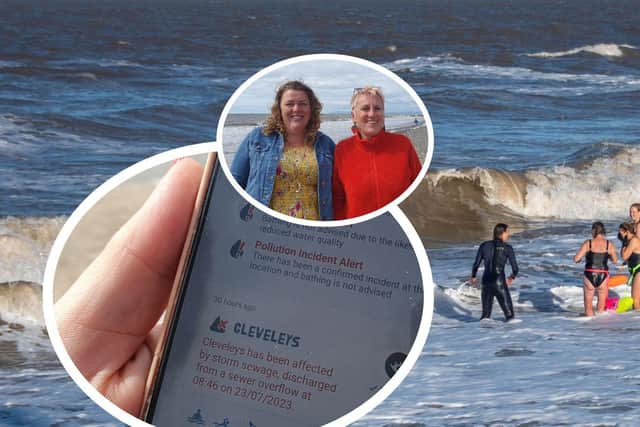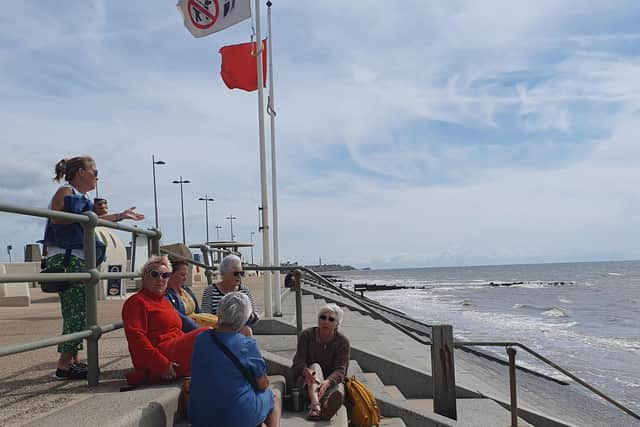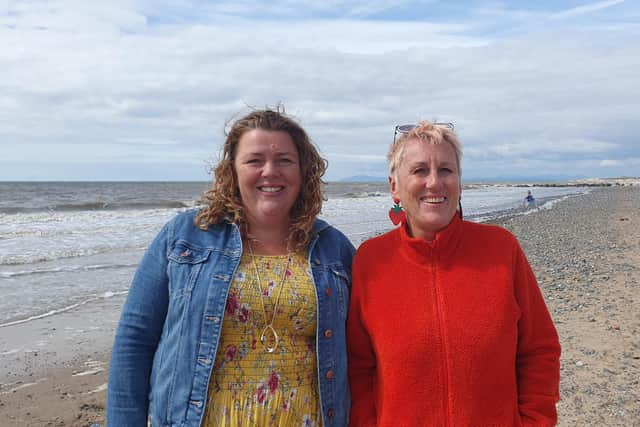Cleveleys Dippers fight back against sea pollution and call for advice about Blackpool and Cleveleys beaches
and live on Freeview channel 276
A group of wild swimmers are fighting back against sewage in the sea and are calling for clearer advice about water pollution on the Fylde Coast.
The ladies’ – who called themselves the ‘Cleveleys Dippers’ – took up the activity because it boosted their mental and physical health after lockdown.
Advertisement
Hide AdAdvertisement
Hide AdBut now their cold water dips have become almost impossible to plan – as sewage discharge warnings have ‘ramped-up’ and their trips to the beach are often ending in disappointment.
Live pollution warnings


Caroline Thompson and her friends had gathered an hour before high tide, on July 24, hoping to get in the sea. But instead, they sat on the steps with a hot drink and a natter.
They use the Safer Seas and Rivers App, which tells users which beaches are safe and which ones have live pollution warnings.
And while previous years have had some sewage alerts, 2023 has seen a worrying surge in these incidents.
Conflicting advice


Advertisement
Hide AdAdvertisement
Hide AdCaroline told the Gazette: “We can’t plan from one day to the next, because we just don’t know whether its going to be safe or not. We’re getting a lot of conflicting advice from different organisations, so the YMCA who commission the lifeguards, the environment agency, the council… depending who you speak to you can get completely different information about whether or not its safe to swim.”
There can be many reasons behind the ‘pollution risk warnings’ that the Environment Agency publishes on the Swimfo site, including rainfall, tides, agricultural and other pollution sources.
Met office figures show that Blackpool has already had its wettest July on record, receiving 340% of normal rainfall over the first 23 days of the month.


Dead birds and raw sewage
The group members said they’ve seen raw sewage floating in the sea and sanitary items washed up on the beach.
Advertisement
Hide AdAdvertisement
Hide AdAnd Jill Reidy, another member of the group, said she recently watched as over 20 dead birds were removed from a small stretch of Cleveleys beach by the environment agency.
She said: “A lot of us have had a lot poorer mental health since we can’t go in. It’s been six weeks since the burst pipe and last week we had one good day when we went in the water at Fleetwood. It really felt like a boost to be able to get back into the sea, an then the next day we were back to square one again and it’s very confusing.”


Demand for answers
The 'Blackpool and the Fylde Coast Sea Users United Against Raw Sewage in Our Seas' group held a meeting at Thornton-Cleveleys last month, Over 40 people were demanding clarity from United Utilities over sewage on the Fylde coast.
The group are currently lobbying MP's, United Utilities, the Environment Agency and the Council about the release of raw sewage into our seas.
What United Utilities say
Advertisement
Hide AdAdvertisement
Hide AdUntreated sewage was released via storm overflows along the Fylde Coast to stop the works from being overwhelmed.
In the early hours of Sunday 11 June a pipe which carries the cleaned and treated water from Fleetwood WwTW and out to the sea, burst.
This meant the WwTW was not running at full capacity and there was reduced storage capacity in the system. Heavy rain then led to storm overflows operating on 12 June. Due to the reduced capacity at the treatment works this was classed by the Environment Agency as an abnormal situation and a no swimming advisory was issued.
The no-swim warnings in place along the Fylde coast were lifted on June 29. But further alerts have been triggered since then.
Advertisement
Hide AdAdvertisement
Hide AdOn July 20, the Environment Agency (EA), which assesses the quality of the water at bathing sites, issued a no-swim warning, which they said was down to the severe weather conditions.
What is storm overflow?
United Utilities responded, by saying that storm overflows are an important part of the sewerage network.
They act as a pressure relief valve when rainfall fills the system, allowing rain water, mixed with sewage, to rise inside the sewer and eventually enter a separate pipe which flows into a river or the sea.
This is designed to help prevent the flooding of streets, homes and businesses.
Advertisement
Hide AdAdvertisement
Hide AdA spokesperson for United Utilities said: “During storm conditions, when sewers and treatment plants are operating at full capacity, we are permitted to spill excess storm water from combined sewer overflows (CSOs)”.
Wettest July on record
Earlier this month, United Utilities held some drop-in sessions to answer questions from the public about urgent repairs to a burst pipe.
A United Utilities spokesperson, said: “The North West coastline has seen billions of pounds of water company investment over the last 30 years, contributing to bathing waters which are now cleaner than they have ever been.
“There will always be times during very heavy rainfall when storm overflows still need to operate. Met office figures show that Blackpool has already had its wettest July on record, receiving 340% of normal rainfall over the first 23 days of the month. Thanks to recent schemes like the Anchorsholme Park storage tank and the new pumping station and long sea outfall, the frequency and impact of storm water has been dramatically reduced along the coast.
Advertisement
Hide AdAdvertisement
Hide Ad“Across the North West we are proposing the largest ever programme of environmental improvements, and we will be spending around £3 billion up to 2030 to further reduce the impact of storm overflows.”
‘Ongoing problem’
The 'Blackpool and the Fylde Coast Sea Users United Against Raw Sewage in Our Seas' group are holding another meeting this Wednesday (July 26) at 7pm. Anyone is welcome to attend, and it’s upstairs at The Venue in Cleveleys.
Caroline added: “The ideal outcome would be to get some answers from the council and the MPs who can actually start to help us coordinate a much bigger effort to stop this being an ongoing problem.”